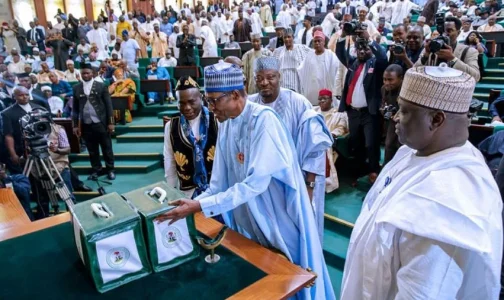FULL BREAKDOWN: 2018 Budget Estimates
President Muhammadu Buhari on Tuesday presented an appropriation bill of N8.612 trillion for 2018. While presenting the document before t...
https://newshelmng.blogspot.com/2017/11/full-breakdown-2018-budget-estimates.html
President Muhammadu Buhari on Tuesday presented an appropriation bill of N8.612 trillion for 2018.
While presenting the document before the joint session of the national assembly in Abuja, the president said the budget was meant to consolidate the achievements of previous budgets.
He said the 2018 budget was also to deliver on Nigeria’s economic recovery growth.
The proposed budget had a 16 percent increase compared to the 2017 appropriation.
Here are the estimates of the budget.
ASSUMPTIONS, PROJECTIONS
• Benchmark crude oil price-US$45 per barrel
• Oil production estimate – 2.3 million barrels per day
• Exchange rate – N305/US$ for 2018
• Real GDP growth of 3.5 percent
• Inflation Rate of 12.4 percent
EXPENDITURE ESTIMATES
The proposed aggregate expenditure of N 8.612 trillion (16 percent above 2017 budget estimate)
will comprise
• Recurrent Costs of N3.494 trillion
• Debt Service of N2.014 trillion
• Statutory Transfers of about N456 billion
• Sinking Fund of N220 billion (to retire maturing bond to local contractors)
• Capital Expenditure of N2.428 trillion (excluding the capital component of statutory transfers).
RECURRENT EXPENDITURE
A substantial part of the recurrent cost proposal for 2018 is for the payment of salaries and overheads in key ministries providing critical public services such as:
• N510.87 billion for Interior
• N435.01 billion for Education
• N422.43 billion for Defence
• N269.34 billion for Health
CAPITAL EXPENDITURE
Key capital spending allocations in the 2018 Budget include:
• Power, Works and Housing: N555.88 billion
• Transportation: N263.10 billion
• Special Intervention Programmes: N150.00 billion
• Defence: N145.00 billion
• Agriculture and Rural Development N118.98 billion
• Water Resources: N95.11 billion
• Industry, Trade and Investment: N82.92 billion
• Interior: N63.26 billion
• Education N61.73 billion
• Universal Basic Education Commission: N109.06 billion
• Health: N71.11 billion
• Federal Capital Territory: N40.30 billion
• Zonal Intervention Projects N100.00 billion
• North East Intervention Fund N45.00 billion
• Niger Delta Ministry: N53.89 billion
• Niger Delta Development Commission: N71.20 billion.

PROJECTS AND PROGRAMMES TO BE IMPLEMENTED IN 2018
• N9.8 billion for the Mambilla hydro power project, including N8.5 billion as counterpart
funding
• N12 billion counterpart funding for earmarked transmission lines and substations
• N35.41 billion for the National Housing Programme
• N10.00 billion for the 2nd Niger Bridge
• About N300 billion for the construction and rehabilitation of strategic roads
SPENDING PRIORITIES FOR PEACE, SECURITY AND DEVELOPMENT
• N65 billion for the Presidential Amnesty Programme has been retained in the 2018 Budget
• Capital provision for the Ministry of Niger Delta increased to N53.89 billion from the N34.20 billion provided in 2017
• Completion of East-West Road, with a provision of about N17.32 billion in 2018
While presenting the document before the joint session of the national assembly in Abuja, the president said the budget was meant to consolidate the achievements of previous budgets.
He said the 2018 budget was also to deliver on Nigeria’s economic recovery growth.
The proposed budget had a 16 percent increase compared to the 2017 appropriation.
Here are the estimates of the budget.
ASSUMPTIONS, PROJECTIONS
• Benchmark crude oil price-US$45 per barrel
• Oil production estimate – 2.3 million barrels per day
• Exchange rate – N305/US$ for 2018
• Real GDP growth of 3.5 percent
• Inflation Rate of 12.4 percent
EXPENDITURE ESTIMATES
The proposed aggregate expenditure of N 8.612 trillion (16 percent above 2017 budget estimate)
will comprise
• Recurrent Costs of N3.494 trillion
• Debt Service of N2.014 trillion
• Statutory Transfers of about N456 billion
• Sinking Fund of N220 billion (to retire maturing bond to local contractors)
• Capital Expenditure of N2.428 trillion (excluding the capital component of statutory transfers).
RECURRENT EXPENDITURE
A substantial part of the recurrent cost proposal for 2018 is for the payment of salaries and overheads in key ministries providing critical public services such as:
• N510.87 billion for Interior
• N435.01 billion for Education
• N422.43 billion for Defence
• N269.34 billion for Health
CAPITAL EXPENDITURE
Key capital spending allocations in the 2018 Budget include:
• Power, Works and Housing: N555.88 billion
• Transportation: N263.10 billion
• Special Intervention Programmes: N150.00 billion
• Defence: N145.00 billion
• Agriculture and Rural Development N118.98 billion
• Water Resources: N95.11 billion
• Industry, Trade and Investment: N82.92 billion
• Interior: N63.26 billion
• Education N61.73 billion
• Universal Basic Education Commission: N109.06 billion
• Health: N71.11 billion
• Federal Capital Territory: N40.30 billion
• Zonal Intervention Projects N100.00 billion
• North East Intervention Fund N45.00 billion
• Niger Delta Ministry: N53.89 billion
• Niger Delta Development Commission: N71.20 billion.

PROJECTS AND PROGRAMMES TO BE IMPLEMENTED IN 2018
• N9.8 billion for the Mambilla hydro power project, including N8.5 billion as counterpart
funding
• N12 billion counterpart funding for earmarked transmission lines and substations
• N35.41 billion for the National Housing Programme
• N10.00 billion for the 2nd Niger Bridge
• About N300 billion for the construction and rehabilitation of strategic roads
SPENDING PRIORITIES FOR PEACE, SECURITY AND DEVELOPMENT
• N65 billion for the Presidential Amnesty Programme has been retained in the 2018 Budget
• Capital provision for the Ministry of Niger Delta increased to N53.89 billion from the N34.20 billion provided in 2017
• Completion of East-West Road, with a provision of about N17.32 billion in 2018






